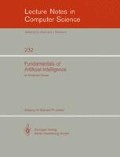Abstract
Computer science has historically required programmers of systems to anticipate every possible behavior that could be desired and to program in advance all the knowledge and mechanisms needed to achieve it. Unfortunately, it has been found that such extensive and explicit programing is expensive and it still, in many cases, does not achieve the range of behaviors that might be needed. The only alternative is to have the machines program themselves to acquire the knowledge they need to function satisfactorily. This chapter has described many mechanisms for machine learning and provides an introduction to the field. Additional information can be found in the references and in the textbook on learning edited by Michalski et al. [83].
Supported in part by the U.S. Army Research Office under grant DAAG-29-84-K-0072
Preview
Unable to display preview. Download preview PDF.
References
D. Angluin and C. Smith [1983], “Inductive inference: theory and methods”, ACM Computing Surveys, Vol. 15.
A. Biermann and J. Feldman [1972], “On the synthesis of finite-state machines from samples of their behavior”, IEEE Trans. on Computers, Vol. C-21.
A. Biermann [1972], “On the inference of Turing machines from sample computations”, Artificial Intelligence, Vol. 3.
A. Biermann, R. Baum, and F. Petry [1975], “Speeding up the synthesis of programs from traces”, IEEE Trans. on Computers, Vol. C-24.
A. Biermann and R. Krishnaswamy [1976], “Constructing programs from example computations”, IEEE Trans. on Software Engineering, Vol. SE-2.
A. Biermann [1978], “The inference of regular LISP programs from examples”, IEEE Trans. on Systems, Man, and Cybernetics, Vol. SMC-8.
A. Biermann and D. Smith [1979], “A production rule mechanism for generating LISP code”, IEEE Trans. on Systems, Man, and Cybernetics, Vol. SMC-9.
A. Biermann, J. Fairfield, and T. Beres [1982], “Signature table systems and learning”, IEEE Transactions on Systems, Man and Cybernetics, Vol. SMC-12, No. 5.
A. Biermann, G. Guiho, and Y. Kodratoff, (Eds.) [1984], Automatic Program Construction Techniquuues, Macmillan Publishing Co., N.Y.
J. Feldman [1972], “Some decidability results in grammatical inference”, Information and Control, Vol. 20.
N. Findler, Ed. [1979], Associative Networks, Academic Press, N.Y.
P. Fink and A. Biermann [1986], “The correction of ill-formed input using history-based expectation with applications to speech understanding”, to appear.
K.S. Fu [1975], Syntactic Methods in Pattern Recognition, Academic Press, N.Y.
M. Gold [1969], “Language identification in the limit”, Information and Control, Vol. 10.
S. Hardy [1975], “Synthesis of LISP programs from examples”, Proc. Fourth International Joint Conf. on Artificial Intelligence.
J.P. Jouannaud and Y. Kodratoff [1979], “Characterization of a class of functions synthesized from examples by a Summers-like method”, Proc. Sixth International Joint Conference on Artificial Intelligence.
S. Mamrak and P. Amer [1978], “Estimation of run times using signature table analysis”, NBS Special Publication 500-14, Fourteenth Computing Performance Evaluation User's Group, Boston, Mass., Oct., 1978.
R.S. Michalski [1980], “Pattern recognition as rule-guided inductive inference”, IEEE Trans. on Pattern Analysis and Machine Intelligence.
R.S. Michalski, J.G. Carbonell, T.M. Mitchell, [1983], Machine Learning, Tioga Publishing Company.
M. Minsky, Ed. [1968], Semantic Information Processing, M.I.T. Press, Cambridge, Mass.
M. Minsky and S. Papert [1969], Perceptrons, M.I.T. Press, Cambridge, Mass.
N. Nilsson [1965], Learning Machines, McGraw Hill.
C. Page [1977], “Heuristics for signature table analysis as a pattern recognition technique”, IEEE Trans. on Systems, Man, and Cybernetics, Vol. SMC-7.
A. Samuel [1959], “Some studies in machine learning using the game of checkers”, IBM Journal of Research and Development.
A. Samuel [1967], “Some studies in machine learning using the game of checkers, II”, IBM Journal of Research and Development.
E.Y. Shapiro [1983], Algorithmic Program Debugging, M.I.T. Press, Cambridge, Mass.
D. Smith [1984], “The synthesis of LISP programs from examples: a survey”, in A. Biermann, G. Guiho, Y. Kodratoff (Eds.), Automatic Program Construction Techniques, Macmillan Publishing Co., 1984.
M. Smith [1973], “A learning program which plays partnership dominoes”, Communications of the ACM, Vol. 16.
P. Summers [1977], “A methodology for LISP program construction from examples”, Journal ACM, Vol. 24.
T. Truscott [1979], “'The Duke checker program”, Journal of Recreational Mathematics, Vol. 12.
L. Valiant [1984], “A theory of the learnable”, Communications of the ACM, Vol. 27.
D. Waterman, W. Faught, P. Klahr, S. Rosenschein, and R. Wesson [1984], “Design issues for exemplary programming”, in A. Biermann, G. Guiho, Y. Kodratoff (Eds.), Automatic Program Construction Techniques, Macmillan Publishing Co., N.Y. 1984.
R. Wharton [1977], “Grammar enumeration and inference”, Information and Control, Vol. 33.
Author information
Authors and Affiliations
Editor information
Rights and permissions
Copyright information
© 1986 Springer-Verlag Berlin Heidelberg
About this chapter
Cite this chapter
Biermann, A.W. (1986). Fundamental mechanisms in machine learning and inductive inference. In: Bibel, W., Jorrand, P. (eds) Fundamentals of Artificial Intelligence. Lecture Notes in Computer Science, vol 232. Springer, Berlin, Heidelberg. https://doi.org/10.1007/BFb0022682
Download citation
DOI: https://doi.org/10.1007/BFb0022682
Published:
Publisher Name: Springer, Berlin, Heidelberg
Print ISBN: 978-3-540-16782-2
Online ISBN: 978-3-540-39875-2
eBook Packages: Springer Book Archive

